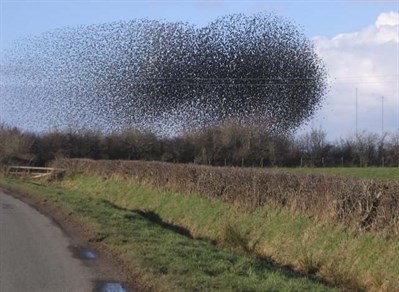
A swarm of starlings clouds the sky over a farmer's field.
Image Credit: SOURCE/ Wikipedia/ John Holmes
(CHARLOTTE HELSTON / iNFOnews.ca)
March 01, 2013 - 11:34 AM
By Charlotte Helston
An Okanagan vineyardist says the B.C. Grapegrower's Association starling control program saves him thousands of dollars every year.
George Heiss has been growing grapes in the Okanagan for over forty years. When he first started up Gray Monk Estate WInery in 1972, Starlings were there to greet him. At first, there were only small flocks, but into the 1980s they really began to multiply. Heiss jokes that his grapes gave the birds a ready food source, which allowed them to flourish. But the relationship isn't mutual. He says a large swarm—made up of thousands of birds—can consume one tonne of grapes in just 15 minutes.
"They do a lot of damage," Heiss says. "It really hurts the grower."
Starlings have an appetite for berries, grapes and tree fruits as well as livestock feed. They're known for taking little bites of fruits, then moving on and doing the same thing over and over again. The marred fruit cannot be sold. The B.C. Grapegrowers Association says the birds cause grape crop losses of more than 1.5 million dollars annually in B.C.
"They usually like the most expensive grapes—pinot noire, merlot," Heiss says. He thinks the birds are attracted to the deep red varieties which are easier to see and coincidentally, more expensive.
But the problem has improved, and Heiss attributes the progress to the Starling control program which traps and euthanizes the birds. The deceased birds are sent to bird rehab centres and falconries to be used as food.
The association has asked the city of Vernon and surrounding districts to renew the $25,000 it gave in 2012. While Vernon and Armstrong have already agreed to contribute, Enderby has decided it's not a priority.
Vernon Coun. Mary-Jo O'Keefe felt it was important to act now and provide $13,000. "I'm saying give them money, the starling program is important, and I don't want to go a year and miss starling control because I think it's devastating," O'Keefe said.
Other councillors were concerned about the dent it would put in the budget. Coun. Catherine Lord said, "It has to increase our budget."
Lord led a motion to have the Regional District of North Okanagan revisit the formula used to tabulate the funding.
"What they do now is they take the property assessments and they base it upon that," Lord says. "What we'd like them to do is take only the farm assessed land and base it on that because it's the farmers who are getting all the benefit. Right now what happens is Vernon ends up paying $13,000, and the bulk of the benefits are in Spallumcheen."
Coun. Patrick Nicol believes it's a regional problem affecting the whole area and the community's food security.
"I do sort of agree with Nicol that everybody in the long run does benefit because of our food source," Lord says. "But I would like RDNO to take a look at the formula and see if it's is the fairest way to do it."
Gray Monk is a member of the B.C. Grapegrowers Association and Heiss says they pay into the starling program themselves.
"It's very important to have this program," Heiss says. "In the 80s it was just terrible, but now, it's gotten quieter, the flocks aren't so big."
Starlings also have an ecological impact on native wildlife because they steal nests and force the original occupants out. They average about eight offspring a year, and make the World Conservation union's list of top 100 worst invasive species on the planet.
To contact the reporter for this story, email Charlotte Helston at chelston@infotelnews.ca or call (250)309-5230.
News from © iNFOnews, 2013